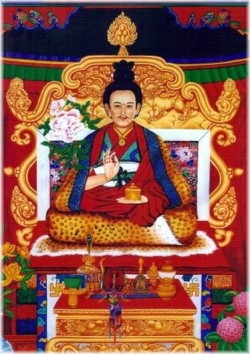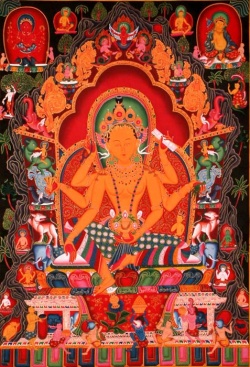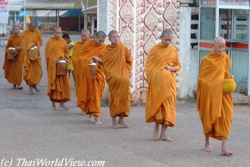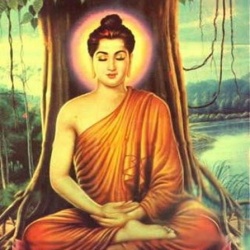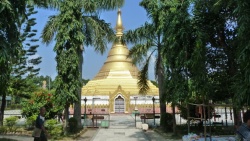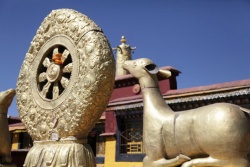Difference between revisions of "Tshal Gungthang"
| Line 143: | Line 143: | ||
{{R}} | {{R}} | ||
[https://collab.itc.virginia.edu/wiki/renaissanceold/'tshal%20gung%20thang.html] | [https://collab.itc.virginia.edu/wiki/renaissanceold/'tshal%20gung%20thang.html] | ||
| − | [[Category: | + | |
| + | [[Category:Tshal Gungthang]] | ||
Latest revision as of 09:43, 6 October 2015
'tshal Gung Thang
'tshal gung thang
Tsel Gungtang ( འཚལ་གུང་ཐང་ or མཚལ་གུང་ཐང་)
by Ben Deitle
General information
Type Information
Name Tsel Gungtang ( འཚལ་གུང་ཐང་)
Variant names mtshal gung thang, tshal gung thang
Period 12th century
Transliteration form ’tshal gung thang
Pronunciation Tsel Gungtang
Etymology unknown
Sectarian affiliation tshal pa bka' brgyud
Source of information TBRC place ID: G30; George Roerich, trans., The Blue Annals (Delhi: Motialal Banarsidass, 1976); Ronald Davidson, Tibetan Renaissance (New York: Columbia University Press, 2005); E. Gene Smith, Among Tibetan Texts (Boston: Wisdom, 2001).
Location In Ü, Central Tibet.
Nation China
Province Tibet Autonomous Region
District
Cultural location Central Tibet
Location's language Central Tibetan dialect (dbus skad)
Location description
Date founded 1175 (Tsel constructed), 1187 (Gungtang constructed)
Founder Yudrakpa Tsöndrü Drakpa (g.yu brag pa brtson 'grus grags pa, 1123-1193), commonly known as Lama Zhang (bla ma zhang)
Abbots
1. Lama Zhang;
2. Shakya Yeshé (shakya ye shes, 1147-1207), abbot from 1194 to 1207;
3. Jang-yé (byang yes), abbot from 1208 to 1210;
4. Lhachuk Kharwa Nyida Ö (lha phyug mkhar ba nyi zla 'od, 1135-1215), abbot from 1210 to 1214;
5. Sanggyé Bum (sangs rgyas 'bum), abbot from 1214-1231;
6. Sanggyé Nyingpo (sangs rgyas snying po, d. 1237), abbot from 1231 to 1237;
7. Rinpoché Sanggyé Zhönnu (rin po che sangs rgyas gzhon nu, d. 1260) abbot from 1238 to 1242;
8. Serkhang Tengpa Künga Gyeltsen (gser khang steng pa kun dga' rgyal mtshan, 1223-1292), abbot from 1261 to 1292;
9. Sang Rinpa (sangs rin pa, 1247-1301), abbot from 1293 to 1302;
10. Shakya Bumpa (shakya ’bum pa, 1265-1310), abbot from 1302 to 1310;
11. Jangchup Pel Zangpo (byang chub dpal bzang po, 1281-1356), abbot from 1310 to 1356;
12. Chennga Drakpa Shenyenpa (spyan snga grags pa bshes gnyen pa, 1322-1381) abbot from 1357-1381.
Blue Annals References 338, 341, 642, 716-7, 1023
Historical Summary
Tsel Guntang was the product of the powerful twelfth century religious figure Lama Zhang, aka Yudrakpa Tsöndrü Drakpa (1123-1193).
As noted by Davidson, it was actually constructed in two phases, with the construction of Tsel monastery carried out first in 1175 followed by the adjacent monastic complex of Gungtang in 1187 (Davidson, 329).
It then became the seat of the Tselpa Kagyü branch (taking its name from the monastery which had taken its name from the locality of Tselpa) of the Dakpo Kagyü, Lama Zhang having been a disciple of Gampopa Dakpo Lhajé.
Lama Zhang set up a successful political administration that controlled the surrounding region.
The political ambitions of the Tselpa Kagyü continued and, as Gene Smith points out, "[t]he fortunes of this reached a peak during the early Yüan period when Tsel Gungtang was the center of an influential myriarchy.
But because one of the myriarchs had been an opponent of Ta'i Si tu Byang chub rgyal mtshan, the sect fell into the shadows" (Smith, 42).
Blue Annals References
Blue Annals citations
338: “Three copies[of the bka' 'gyur and bstan 'gyur] were prepared at 'tshal gung thang in the lower country.”
341: “The ācārya shak gzhon received assistance from tshal pa smon lam pa and others, and founded a monastic college at 'tshal gung thang (near lha sa).
The ācārya shak gzhon having gone to the monastery of [F:7a] ne'u thog, the ācārya don grub dpal was appointed abbot of chos 'khor gling.
He was succeeded by blo bzangs, bsod nams dpal, byams pa and kun bzangs pa. This is the "Branch" of the "Lower" Monastery (gling smad pa).”
716- 717: “8.22 Abbatial lineage of Tshal Gungthang (mtshal gung thang pa’i bla rabs kyi skabs.
Chengdu 838; Roerich 716). zhang rin po che's successor, the incomparable Śākya ye shes was born in the year Fire Female Hare (me mo yos 1147 A.D.).
At the age of forty-eight, in the year Wood Tiger (shing stag, 1194 A.D.) he was appointed abbot.
He died at the age of sixty-one.
Next year, an Earth Male Dragon year (sa pho 'brug 1208 A.D.), the ācārya byang yes was appointed (abbot).
Then after three years, in the year Male Horse (lcags pho rta, 1210 A.D.) he entrusted the chair to lha phyug mkhar ba.
In the next [[Wood Male Dog}} (shing pho khyi, 1214 A.D.) [F:138a] year, sangs rgyas 'bum was appointed to the chair.
Then, after eighteen years, in the year [[Iron Female Hare (lcags mo yos, 1231 A.D.) sgom pa ye shes expelled sangs rgyas 'bum, and sangs rgyas snying po was nominated to the chair.
Seven years after that, in the year Fire Hen (me bya, 1237 A. D.) he died.
In the following Earth Male Dog (sa pho khyi, 1238 A.D.) rin po che sangs rgyas gzhon nu was appointed to the chair.
In the fifth year of his abbotship, in the Water Tiger (chu stag, 1242 A.D.) year, the abbot sangs rgyas 'bum me was permitted to return, and founded sGom sde. sangs gzhon pa died in the year Iron Ape (lcags spre'u 1260 A.D.) after occupying the chair for twenty-three years.
The rin po che gser khang stengs pa kun dga' rgyal mtshan was born in the year Water Female Sheep (chu mo lug, 1223 A.D.).
At the age of thirty-eight, he was appointed to the abbot's chair, and occupied the chair for thirty-three years. He passed away at the age of seventy in the year Water Dragon (chu 'brug, 1292 A.D.). rin po che sangs rin pa, born in the year [[Fire] Female Sheep]] (me mo lug, 1247 A.D.), was appointed to the chair at the age of forty-six.
He died at the age of fifty-five, in the year Iron Ox (Icags glang, 1301 A.D.).
In the same year, rin po che Śākya 'bum pa, born [R:717] in the year Wood Female Ox (shing mo glang, 1265 A.D.), aged thirty-seven, was appointed to the chair.
After him, in the 12th month of the Water Male Tiger year (chu pho stag, 1302 A.D.) Ti śrī. (Ti shih) grags pa 'od zer passed away.
This Water Male Tiger (chu pho stag, 1302 A.D.) is the (birth) year of the ācārya byang rgyal.
In the year Water Female Hare (chu mo yos, 1303 A.D.) 'jam dbyangs rin rgyal. proceeded to the Imperial Palace. rin po che Śākya 'bum pa occupied the chair for ten years and passed away in the year Iron Male Dog (Icags pho khyi 1310 A. D.). rin po che byang chub dpal bzang po, aged thirty, was appointed to the chair during that year.
He was born in the year Iron Serpent (lcags sbrul, 1281 A.D.), occupied the chair for forty-seven years, and died in the year Fire Male Ape (me pho spre'u, 1356 A.D.).
After him spyan snga grags pa bshes gnyen pa, who was born in the year Water Male Dog (chu pho khyi, 1322 A.D.).
At the age of thirty-six, in the year Fire Female Hen (me mo bya 1357 A.D.) he was appointed to the abbot's chair.
He acted as abbot for twenty-four years, and died at the age of sixty in the year Iron Hen (Icags bya, 1381 A.D.).
After that, from the year Water Dog (chu khyi, 1382 A.D.) to the year Fire Ape (me spre 1476 A.D.) 95 years have passed.
In general, from the birth of zhang rin po che to the year Fire Ape (me spre, 1476 A.D.) [F:138b] 354 years have passed. The Chapter on the succession of abbots, of mtshal gung thang.”
